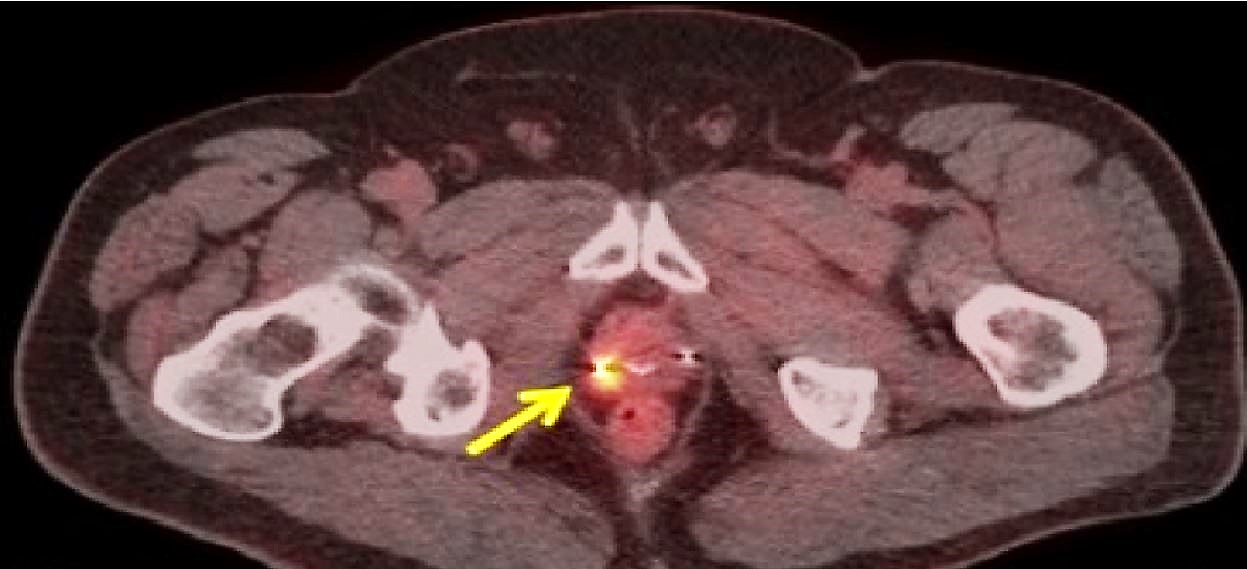There are currently many modalities that have been used in the past and currently being used for imaging in the setting of PSA only recurrence. These include bone and conventional CT scans, PET-choline, PET-fluoride, PET-fluciclovine, PET PSMA, and whole-body and axial MRI.
A conventional CT scan was shown to be positive in less than 5% of cases when a patient experiences PSA recurrence with a PSA of up to 7 ng/ml. Due to this low percentage, it is clear that conventional CT should not be used in this setting.1 A positive CT scan is greatly dependent on the PSA level and the PSA velocity.
PET-Choline in this setting has shown a sensitivity and specificity of 86-89%.2 When bone scans were shown to be negative, PET-Choline has been shown to be positive in 15% of cases.3 The sensitivity and specificity of PET-Choline change according to the PSA level. When the PSA is less than 1 ng/ml and when it is >5 ng/ml the sensitivity and specificity change from 5% to 24% and from 67% to 100%, respectively.4 Summarizing the finding for PET-Choline, Dr. Izquierdo recommends considering performing PET-Choline when the PSA level is between 1-2 ng/ml if no other PET imaging modality is available.
Next, PET-Fluoride and PET-Fluciclovine were discussed. The Fluoride radiotracer shows better sensitivity than bone scan in metastatic prostate cancer patients. However, it cannot assess visceral metastasis in a satisfactory manner, and it has low specificity. PET-Fluciclovine demonstrates better sensitivity than PET-Choline for the detection of relapse5 (Figure 1), but as PET-Choline, it depends on the PSA level.
Figure 1 – F-fluciclovine PET/CT Imaging demonstrating a local recurrence following treatment with external beam radiation

PET-PSMA was discussed next and this promising imaging modality has shown better sensitivity than PET-Choline for low PSA levels (<1 ng/ml). However, it is also affected by PSA velocity. PET PSMA has shown an ability to change management in almost 50% of patients.6
For the whole body and axial MRI – the data is very limited resulting in its role to be unclear.
Dr. Izquierdo concluded her talk summarizing the role of imaging in recurrences after surgery and radiotherapy for localized prostate cancer. In the setting of recurrence after surgery, MRI can detect local recurrences in the prostatic bed, but the sensitivity with low PSA levels (<0.5 ng/ml) remains controversial. PET-Choline has an even lower sensitivity than MRI at a PSA lower than 1 ng/ml. However, PET-PSMA has shown better results with positive findings in 15-85% of patients with biochemical recurrence at a PSA level of less than 0.5 ng/ml.
In recurrence after radiotherapy MRI has shown excellent results for biopsy targeting and guiding local salvage treatment. For PET-PSMA in this specific setting, the data is still limited.
Presented by: Laura Izquierdo, MD, PhD, Department of Urology, Hospital Clinic, Barcelona, Spain
Written by: Hanan Goldberg, MD, Urology Department, SUNY Upstate Medical University, Syracuse, New York, USA, Twitter: @GoldbergHanan at the 39th Congress of the Société Internationale d'Urologie, SIU 2019, #SIUWorld #SIU2019, October 17-20, 2019, Athens, Greece
References:
1. Beresford MJ, Gillatt D, Benson RJ, Ajithkumar T. A systematic review of the role of imaging before salvage radiotherapy for post-prostatectomy biochemical recurrence. Clinical oncology (Royal College of Radiologists (Great Britain)) 2010; 22(1): 46-55.
2. Fanti S, Minozzi S, Castellucci P, et al. PET/CT with (11)C-choline for evaluation of prostate cancer patients with biochemical recurrence: meta-analysis and critical review of available data. European journal of nuclear medicine and molecular imaging 2016; 43(1): 55-69.
3. Evangelista L, Zattoni F, Guttilla A, et al. Choline PET or PET/CT and biochemical relapse of prostate cancer: a systematic review and meta-analysis. Clinical nuclear medicine 2013; 38(5): 305-14.
4. Mitchell CR, Lowe VJ, Rangel LJ, Hung JC, Kwon ED, Karnes RJ. Operational characteristics of (11)c-choline positron emission tomography/computerized tomography for prostate cancer with biochemical recurrence after initial treatment. The Journal of urology 2013; 189(4): 1308-13.
5. Nanni C, Zanoni L, Pultrone C, et al. (18)F-FACBC (anti1-amino-3-(18)F-fluorocyclobutane-1-carboxylic acid) versus (11)C-choline PET/CT in prostate cancer relapse: results of a prospective trial. European journal of nuclear medicine and molecular imaging 2016; 43(9): 1601-10.
6. Roach PJ, Francis R, Emmett L, et al. The Impact of (68)Ga-PSMA PET/CT on Management Intent in Prostate Cancer: Results of an Australian Prospective Multicenter Study. Journal of nuclear medicine : official publication, Society of Nuclear Medicine 2018; 59(1): 82-8.


